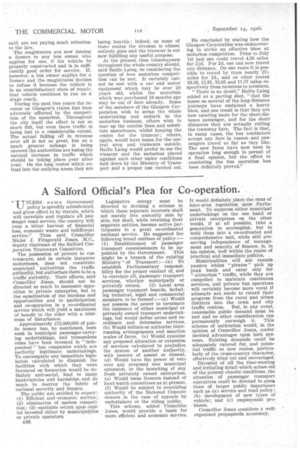A Salford Official's Plea for Co-operation.
Page 56

If you've noticed an error in this article please click here to report it so we can fix it.
" UNLESS some Government policy is speedily adumbrated, and given effect to by statute, which will correlate and regulate an passenger road service, the country will reap a bitter harvest of financial loss, economic waste and indifferent service." Thus said Councillor Major J. Fitzgerald Jones, M.C., deputy chairman of the Salford Corporation Tramways Committee.
The possession of powers to run tramcars, and in certain instances motorbuses, does not constitute municipal authorities the traffic authority, but authorizes them to be a traffic authority. Their efforts, said Councillor Jones, should not be directed so much to insensate opposition to private enterprise, but to the equalization of the burdens and opportunities and to participation and co-operation in a co-ordinated service which will yield a maximum of benefit to the rider with a minimum of disturbance.
Approximately E75,000,000 of public money has, he mentioned, been sunk in municipal passenger-carrying undertakings, and tremendous sums have been invested in " independent " bus companies which are perfectly legitimate undertakings. To contemplate any immediate legislation calculated to diminish the facilities with which they, were favoured on formation would be definitely anti-social, lead to many bankruptcies and hardships and do much to destroy the fabric of national security and finance.
The public are entitled to expect : (1) Efficient and •economic service ; (2) elimination of useless competition; (3) equitable return upon capital invested either by municipallties or private operators.
B38
Legislative energy must be directed to devising a scheme in which these separate interests shall not merely live amicably side by side, but shall, while retaining their separate entities, become active participants in a great co-ordinated national service. He suggested the following broad outlines of policy :(1) Establishment of passenger transport commissioners to be appointed by the Government. This might be a branch of the existing Ministry ' of Transport :—(a) To establish Parliamentary responsibility for the proper conduct of, and to correlate all, passenger transport services, whether municipally or
privately owned. (2) Local area passenger transport boards, including technical, legal and commercial members, to be formed ;—(a) Would not possess the power to terminate the existence of either municipal or privately owned transport undertakings, but would define areas and coordinate and determine services. (b) Would initiate or authorize interrunning arrangements and sanction scales of fares. (c) Would examine any proposed alteration or extension of services calculated to prejudice the system of another authority, with powers of assent or dissent.
(d) Would have the power of veto over any proposed new municipal extension, or the launching of any, fresh privately owned enterprises.
(e) Would issue licences instead of local watch committees as at present.
(f) Would be subject to overriding authority of the National Commissioners in the case of appeals by undertakers or the riding public.
This scheme, added Councillor Jones, would provide a basis for more efficient and economic service. It would definitely place the onus of inter-area regulation upon Parliament. To suppress either municipal undertakings on the one hand or private enterprises on the other would, if at all possible, take a generation to accomplish, but to weld them into a co-ordinated and comprehensive unit, while still preserving independence of management and sanctity of finance, is, in his opinion, well within the realm of practical and immediate politics.
Municipalities will not remain passive whilst " pirates " pick up peak loads and cater only for " attraction " traffic, while they are compelled to maintain continuous services, and private bus operators will certainly become more vocal if attempts are made to retard their progress from the rural and Urban districts into the town and city traffic centres. But, in any event, reasonable public demand must be met and no other consideration can permanently outweigh it. This scheme of unification would, in the opinion of Councillor Jones, confer decided advantages upon both systems. Existing demands could be adequately catered for, and potential traffic on new routes, particularly of the cross-country character, effectively tried out and encouraged.
Divested of all the time-wasting and irritating detail which arises out of the present chaotic conditions, the attention of passenger transport executives could be devoted to quese tions of larger public importance such as 4a) service and road policy: (b) development of new types of vehicle ; and (c) employment problems.
Councillor Jones considers a wellorganized propaganda necessary.




































































































